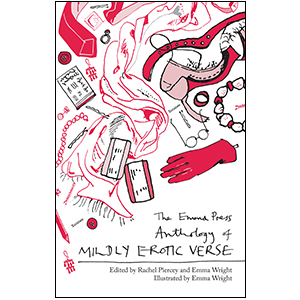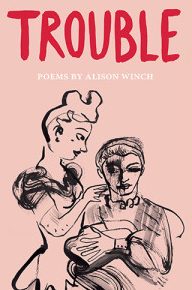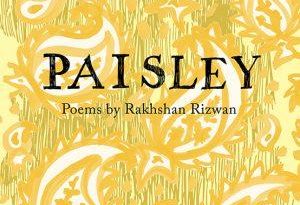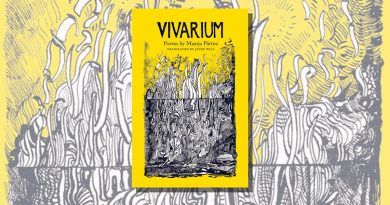The Emma Press Anthology of Mildly Erotic Verse (ed. Rachel Piercey and Emma Wright)
-Reviewed by Alex Campbell–
Emma Press’ new collection – the Anthology of Mildly Erotic Verse makes me long for the days when collections of poetry were known as “treasuries”, because there are some genuine treasures to be found within this slim volume.
In her mission-statement of an introduction, Emma Wright states that she wanted the collection to “skate the line between teasingly sketchy and uncomfortably raw,” and in that it succeeds in abundance. Every poem in this collection is entirely genuine in its emotion; nothing is overblown, overdressed, no puddings over-egged. There is an unglossed reality to them that excites and gratifies; a real-world silliness, sex with the crusts left on. We kick things off with Amy Key’s opening poem, “Tight Dress”, grounding us with the little thoughts that always run through your mind; remembering “if the bed is made, or unmade,” “Should [you] save up sex until morning?” and of course, “I’m not sure if I can take off the dress in a way that looks good.” It’s unromantic, but perhaps all the more fun because of it. It’s not a fairy tale; it’s utterly real, and sexy in its unsexiness.
Which is not to say that the fairytales cannot be sexy too. Nor even that they cannot be silly and playful. The short, “Fairy Tale” by Lawrence Schimel is most definitely the latter; comparing male genitalia to the frog that must be kissed in order to grow into a prince. Not a particularly original comparison, and one that I would imagine would garner as many raised eyebrows for its arrogance as smiles for its cheek. This collection has better ‘fairy tale’ poems to offer, like Jaqueline Saphra’s “Frozen Man”, and one of my favourites of the collection, “Hare” by Hugh Dunkerley, both exploring the sensuality of metamorphosis, and the mystery inherent in the transience of sexual experience.
The joy in the anthology seems to be divided equally between finding the sublime in the ordinary, and the ordinary in the sublime. While “Hare” sees wonder in the “changeling” their lover becomes, and “The Frozen Man” conjures up a “white-blue beauty” with a poem almost like a magic spell or incantation, images created “At the cusp of the year in absolute dark”, “Magician’s Assistant” by Richard O’Brien finds magic and sensuality in tawdry hotels and discarded sequins. Clattering through the mini-bar, “half-dressed and more than halfway drunk,” with “the Great, the Grand” – hyperbolic magician’s titles undermined by the simplicity of the scene – by some sleight of hand becomes something charming and beautiful; sweet, simple, completely unpretentious and wonderful in its ordinariness.
However, whilst a more mudane, earthy touch works in some poems, it doesn’t always add to a work. “Beyond the Carrot” by Julie Mullen, though sporting some fantastic turns of phrase (“tattyhatted, fatted cravatted”) and a very relatable scenario of frustratingly wanting something you hate, is to my mind spoiled by its last line of “Why had I waited so long to go veggie?”. The colloquialism and suddenly chatty tone breaks the pace of a poem that could have done much better without it.
There are so many gems to be uncovered in this slim volume; the playfulness of “Glamour” and “Pinkie Minimus,” revelling in a childlike sense of discovery, and a studied naivety; the dark, sensuality of “The Jackal and the Moon”, “[sinking] his teeth into soft skin/ worrying at her woman’s bones,”; the distant, dreamy admiration of “The Student”; the geological vastness and timelessness of “Radiocarbon Dating”…
Perhaps what’s most surprising about this collection is that it isn’t more of a mixed bag. Eroticism is such a subjective quality for a poem – what one person finds stimulating, another may find bland and unappetising. The most likely explanation for the consistent success of Emma Press’ offering, besides the evident quality of the poems, is that they all adhere to that requirement of being “mildly” erotic; for the most part they hint, they tantalise, they suggest instead of outright stating and they allow the reader space to bring their own taste to bear, and their imagination to expand on the poems’ prompting. Even the refreshing directness of Emma Reay’s “Have You Imagined Having Sex With Me” takes place in the space around the act, the anticipation and the promise yet to be fulfilled, and the infinite possibilities yet to be defined.






